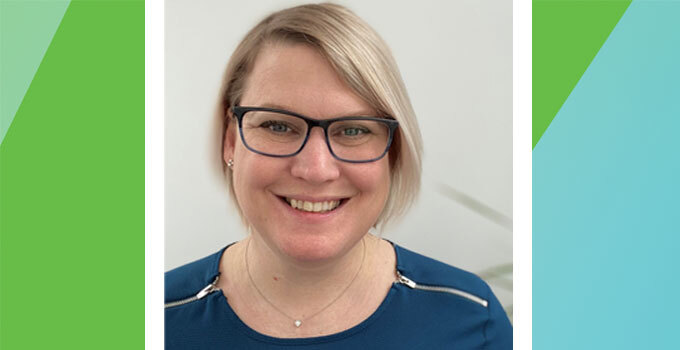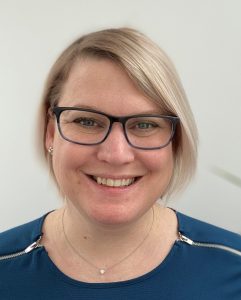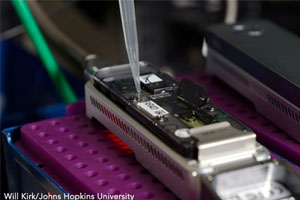We asked Dr. Mélanie Courtot about her research interests and her new role as OICR’s Director of Genome Informatics.
OICR-supported projects generate huge amounts of genomics data that have the potential to inform major innovations in the detection, diagnosis and treatment of cancer. But to have an impact, those data need to be accessible to the many researchers investigating why and how cancer develops.
Dr. Mélanie Courtot joined OICR in January 2022 as Director of Genome Informatics and incoming Principal Investigator, bringing a passion for building intelligent data systems to help improve human health. She recently spoke to OICR News about her new role and her vision for a harmonized “knowledge ecosystem” for cancer data.
How did you first become interested in bioinformatics?
I’ve always wanted to work in the health domain. Health affects everyone, and there are so many great opportunities to make an impact. I’ve also always liked computers because they are very black and white. You input instructions and they either work, or they don’t. I’m very logical and the clear instructions and clear results with computers suit me well.
I did my bachelor studies in structural biochemistry and then earned a master’s degree in computer science in 2002. At the time, the Human Genome Project was all over the news and bioinformatics was quite trendy. I saw that it was a discipline that could bring together two domains I liked: health and computing. It was a natural fit, and so I began working as a software engineer and consultant in the bioinformatics space and ended up doing a PhD in bioinformatics at The University of British Columbia.
After several years at the European Bioinformatics Institute, you joined OICR as Director of Genome Informatics in January. Tell us about that role.
I lead the Genome Informatics team, which develops algorithms, software products and production systems for OICR’s Big Data platforms. OICR and our supported programs are collecting more and more genomics data, and we want that data to be useful to other researchers. So we need to make the data sets accessible, and integrate them in a way that researchers can find them and use them to build their own research studies and test their own hypotheses. We also maintain a large data processing centre, which addresses a lot of issues around scalability and the size of data sets.
What made you want to work at OICR?
The team at OICR has an excellent reputation, so that attracted me. I’m also really looking forward to collaborating closely with other teams and programs at OICR that are leveraging the data downstream. It’s great to create data platforms, but in the past, I was a bit further away from the application side. I am excited to have a closer connection with the researchers using the data because it’s the users who should drive the type of data we collect and how it should be annotated and made accessible. Working closely with them will help improve processes on both sides, and I look forward to helping the data drive innovations in other programs.
You are also an incoming Principal Investigator at OICR. What are your research interests?
My research is around data quality, data integration and data availability. I’m really interested in how we handle and integrate Big Data in disparate data sets. In the health domain, everybody is generating their own data in their own ways, and it comes from many different places — from hospital data to research institutions to patient registries. There is so much data in so many places, and if they’re not linked or harmonized, the right data can be hard to find, tough to access and too heterogenous to use efficiently.
My research is about finding ways to improve how data sets are stored, processed and linked so they can be reused by scientists to make important discoveries. My dream is to create a knowledge ecosystem for health data that informs cancer detection, diagnosis and treatment.
What is the potential of harnessing all this data?
If researchers can effectively access and use the data, they can explore the relationship between different data attributes and potentially identify biomarkers that help determine if cancer is likely to develop and — if it does — how best to treat it. Providing this precision care will increase people’s chance of surviving cancer.
For example, imagine going to a clinic for your annual health checkup. They draw some blood and run a panel of diagnostic assays. They refer to your family history and your DNA sequence and ask some questions about your lifestyle. And based on this data, they find that you have an increased risk of developing cancer in the next five years. With that knowledge, you can be monitored more closely to ensure that if cancer develops, it is caught as early as possible and can be treated in a way that is tailored to your specific health needs. This also benefits the health system, because treating cancer earlier is less complicated and less costly.
That’s my vision: transform healthcare by integrating genomics, lifestyle and environmental data to better understand, detect and treat cancer.



